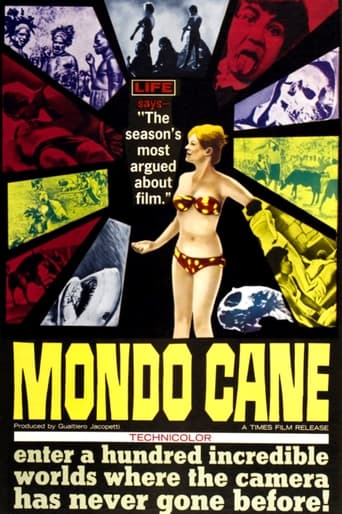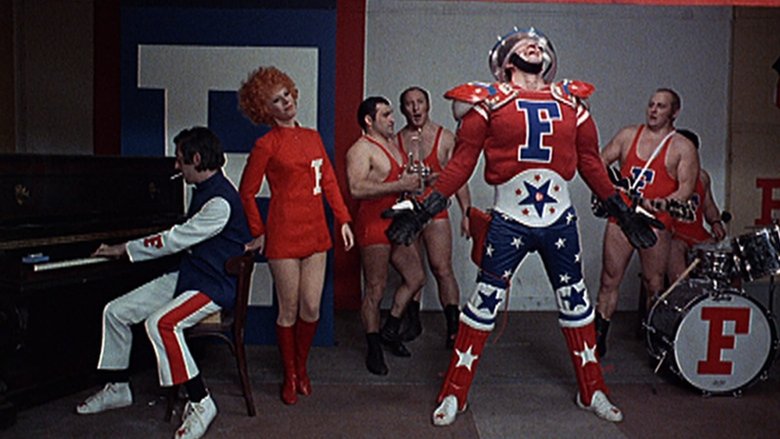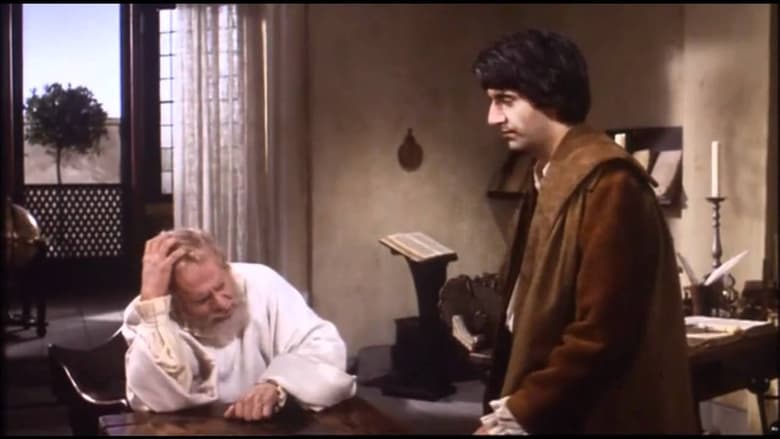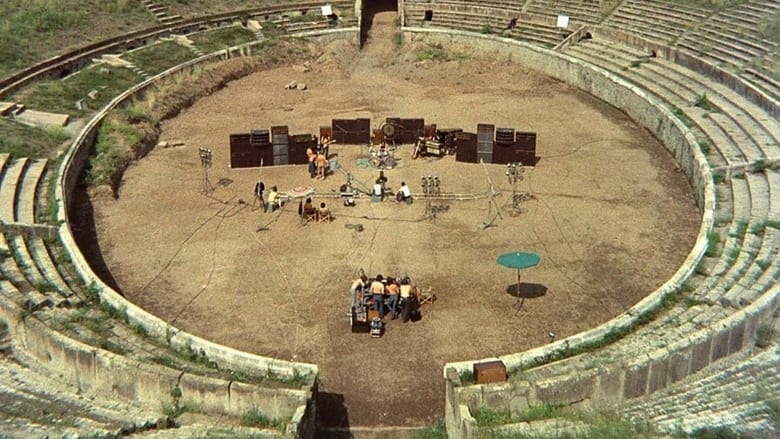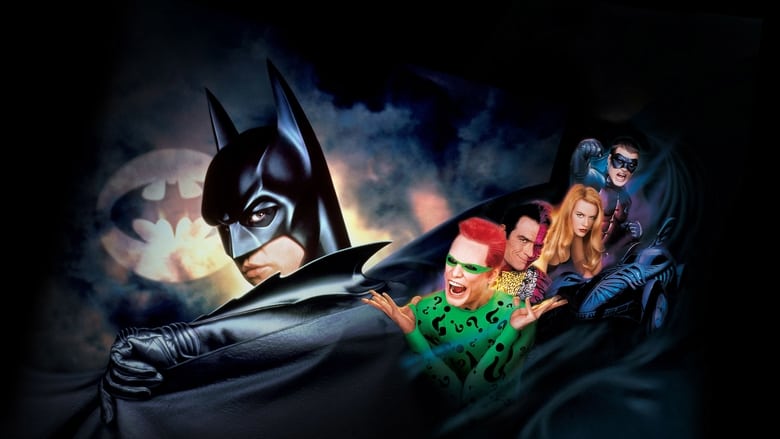A documentary consisting of a series of travelogue vignettes providing glimpses into cultural practices throughout the world intended to shock or surprise, including an insect banquet and a memorable look at a practicing South Pacific cargo cult.


Similar titles



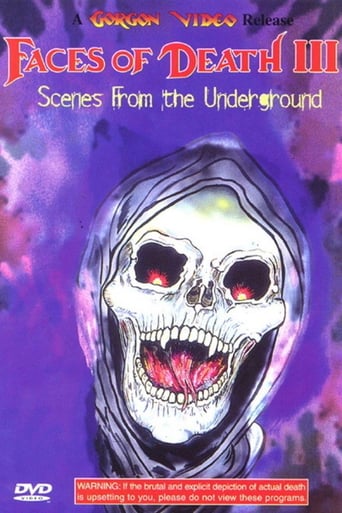
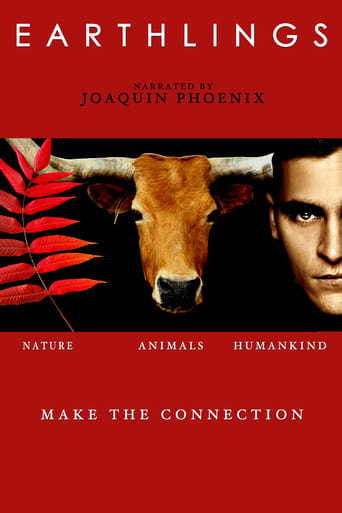
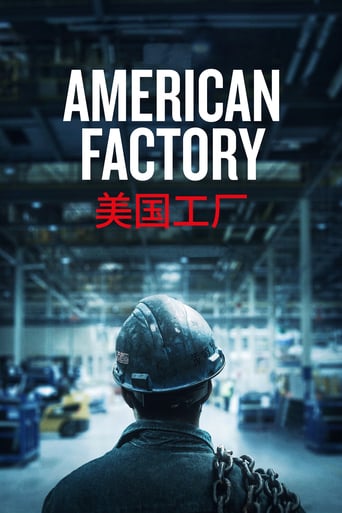
Reviews
With no continuity from one scene to the next, I feel there is no reason for continuity in my review of this early '60s mockumentary: dog fighting in opening title sequence. Plenty of topless girls in the first scenes, from sun bathers to New Guinea bushwomen. Headhunters. Brutal slaughter of animals and their subsequent cooking. Dogs relieving themselves on gravestones. Too many scenes of animal cruelty, difficult watch. Dying baby chickens multicolours, silly. Massaging of calves, could this have been Ian Fleming's inspiration for a similar scene in his novel, You Only Live Twice? Malaysian burials at sea. Drunks dancing in the streets. And so forth and so on. Mostly travelogue material here, it possibly held some shock value on its original release but seems quite tame now, not to mention rather pointless. This film is a documentary without a subject, meandering through an hour and forty-five minutes or so, elaborately showing us nothing in particular. Pick any one of its scenes at random, and it could have been expanded into a ten minutes-long vignette, and might have had better results than the entire film. The waltz-like end theme goes on for about 45 seconds after closing credits end.
"Mondo Cane" (1962) is an update of Homer (fl. c. 800 BC and Aesop (fl. c. 620 BC - 560 BC).....a warning to avoid the bad guys!---------------Throughout cultural history in almost all cultures, cultural leaders and artists of fame and importance warn audiences to think twice about people and situations which look good but which are dangerous and should be avoided.Two early examples are Greek authors Homer and Aesop, and the list at least from their times now thousands of years past is long, and extends to the present day, and into the art of current day cinema.Gualtiero Jacopetti, credited as the main creator of the documentary movie titled "Mondo Cane" (1962 Italy) is a recent example of Cassandra type artists/ cultural leader who scream out "Beware!" to the rest of us.Do most people get the point, take the advice of warning givers in the tradition of Homer, Aesop, and Jacopetti, and many, many others (some listed below)?No....but the warnings continue in an unending stream, and are a noticeable part of cultural history, worth respecting as a phenomenon, even if not agreed with or heeded, which mostly, warnings given by cultural leaders are not (which explains why so few people presently or ever during past history are cultural!).What's the big deal (the latest big deal) about Jacopetti and his "Mondo Cane" (1962) movie, eh?We see the beautiful people (mainly the beautiful bathing beauty girls of 1962's "White Australia") at the start of the movie contrasted with others from places like Borneo, Fiji, and Malaysia (rural Italy and sports enthusiast Portugal are also included).The message is clear...........most of the people and much of what some people in the world do is ugly, uncivilized, dangerous, and should be refused and avoided.This is not a "love thy neighbor" movie, and refusing "love for thy neighbor" is not a new theme historically.Homer's "Trojan Horse" story part of his Odyssey epic poem is an early example. Accepting the big horse outside the gates of Troy might seem like a good idea, but, in hindsight, we realize it would be better for the besieged Trojans to have left it where they found it, and best to destroy it where they found (outside the gates of Troy) if that had been practical.Two hundred years after Homer (fl. c. 800 BC), roughly, came Aesop (fl. c. 620 - 560 BC), also a Greek who also lived in present day Turkey (aka "Anatolia").Aesop gives us yet another "avoidance is best" story with his "Farmer and the Viper" fable of fame.For those who don't know, "The Farmer and the Viper" is one of Aesop's Fables, numbered 51 in the Perry Index. It (Aesop's Fable) has the moral that kindness to the evil will be met by betrayal and is the source of the idiom 'to nourish a viper in one's bosom'. The story concerns a farmer who finds a viper freezing in the snow. Taking pity on it, he picks it up and places it within his coat. The viper, revived by the warmth, bites his rescuer, who dies realizing that it is his own fault. In an alternative version, the farmer brings the viper home to warm by the fire. When it threatens his wife and children, he kills it with an axe. It is the latter version that appears in La Fontaine's Fables (VI.13) as Le villageois et le serpent; this ends with the detail that the farmer cuts the snake in three and the parts struggle to re-unite themselves.The "brotherhood of man" doesn't extend to vipers (Aesop's opinion) any more than it extends to Trojan Horses (Homer's opinion).Cultural history marched on into relatively recent times, and the cavalcade of writers giving us "Beware" type messages continued.Thomas Hobbes, Voltaire, the Marquis De Sade, Darwin, Spencer, Thomas Henry Huxley, William Graham Sumner, movies of the 1960's protest era including "Mondo Cane," (1962), "Marat/ Sade" (1966), and "Zabriskie Point" (1969), and more recently William O. Wilson, Harvard University's embattled "Sociobiologist" of fame, still alive, kicking, and writing (in his 80's as of 2013) "Beware" messages to us all about the problems of "Inclusionism" in the same spirit as Homer urged us to avoid (i.e. "don't include) Trojan Horses.It's up to us to choose........the Australian bathing beauty girls or the Borneo people (who take up much more of "Mondo Cane" 's screen time, so the avoidance point Jacopetti makes is all the more emphatically made......ignored though it was in the "brotherhood of man" historical period which came immediately after the 1962 release of the "Mondo Cane" movie). We are told (by some, not all) that we are "all brothers" and it's not a good (or moral) idea to avoid particular groups of people, regardless of visual and other evidence we take in. Is that true?The long train of historical (including cinematic) cultural "Cassandra's" include many who say (nay, yell loudly, as Jacopetti does in "Mondo Cane" 1962), "No, it is not true, and don't be taken in by the tidal waves of copious propaganda urging otherwise for self-interested, hidden agenda reasons (often not identified or discussed by the warning givers)."Only the wise survive......... most of the time. Be wise.........it can't hurt.-------------------------Tex (David) Allen is a SAG-AFTRA actor who has written many reviews of books and movies.Email: [email protected]
If you are into movies like "Cannibal Holocaust", "Caligula" or "Faces of Death", probably you will find this "documentary" interesting. Otherwise, if you are not into this kind of films, you will find this gross, tedious, disgusting, exploitative, lame, uninspired and immensely pretentious (Yes, pretentious) Because this movie, like "Caligula" dis some year later, tries too hard to be the most shocking film ever made, showing us the most unpleasant kind of scenes, one after another, but there is no beauty, there is no art in any single frame of this, only a convoluted mess that tries to show us some of the most decadent aspects of humanity in a sensationalistic way. "Mondo Cane" is a horrible film, the kind of film that I won't like to see again ever in my life.I give this one star, only because I can't rate it lower.
Not for the faint of heart or for those easily offended or easily bored by documentary 'filler'. This film and its' sequel are documents of a different time,....the 1960's, way before the internet, cable and satellite TV brought us the world instantly. It brought the world to the masses. People were not jumping on planes and going to Africa, Asia or anywhere else like we do now. These brought the unusual strange parts of the world to them at their local cinema.Violent, Odd and downright strange are good words to describe this film.Not your typical documentary film, to be sure. YOU HAVE BEEN WARNED!
